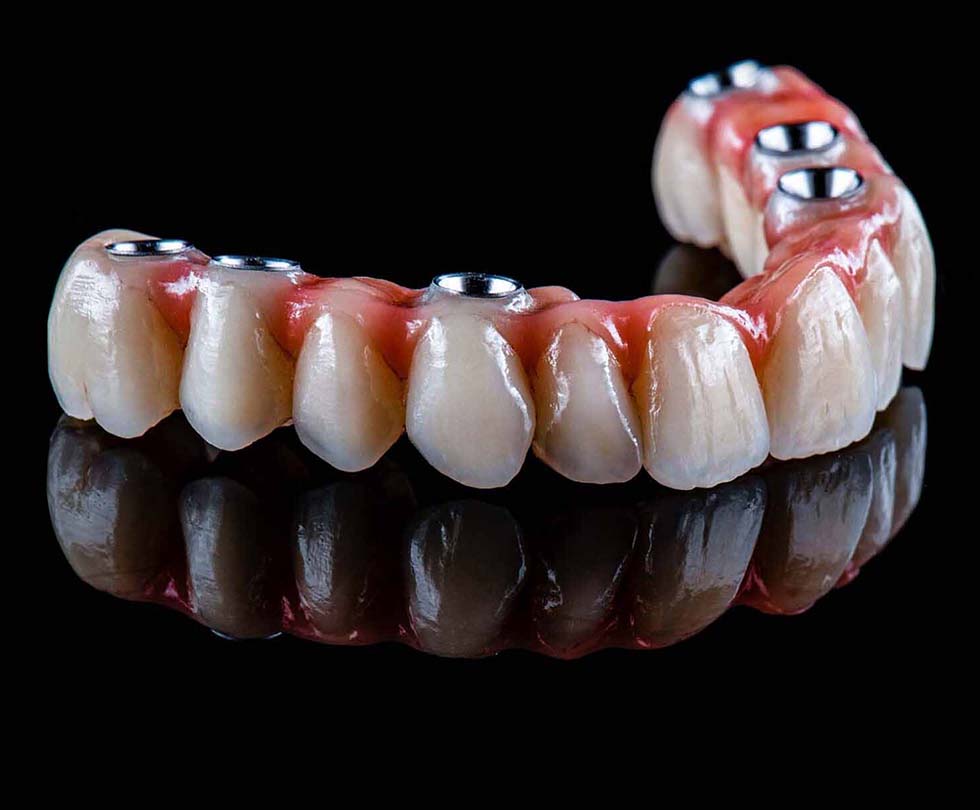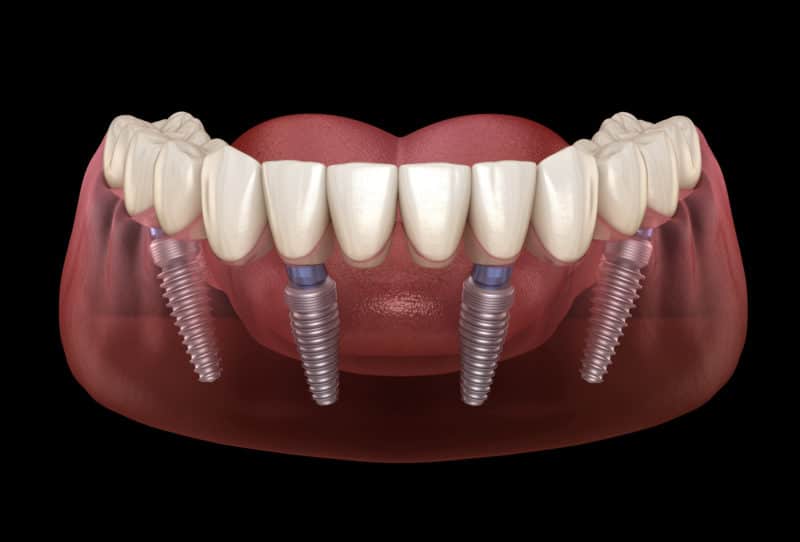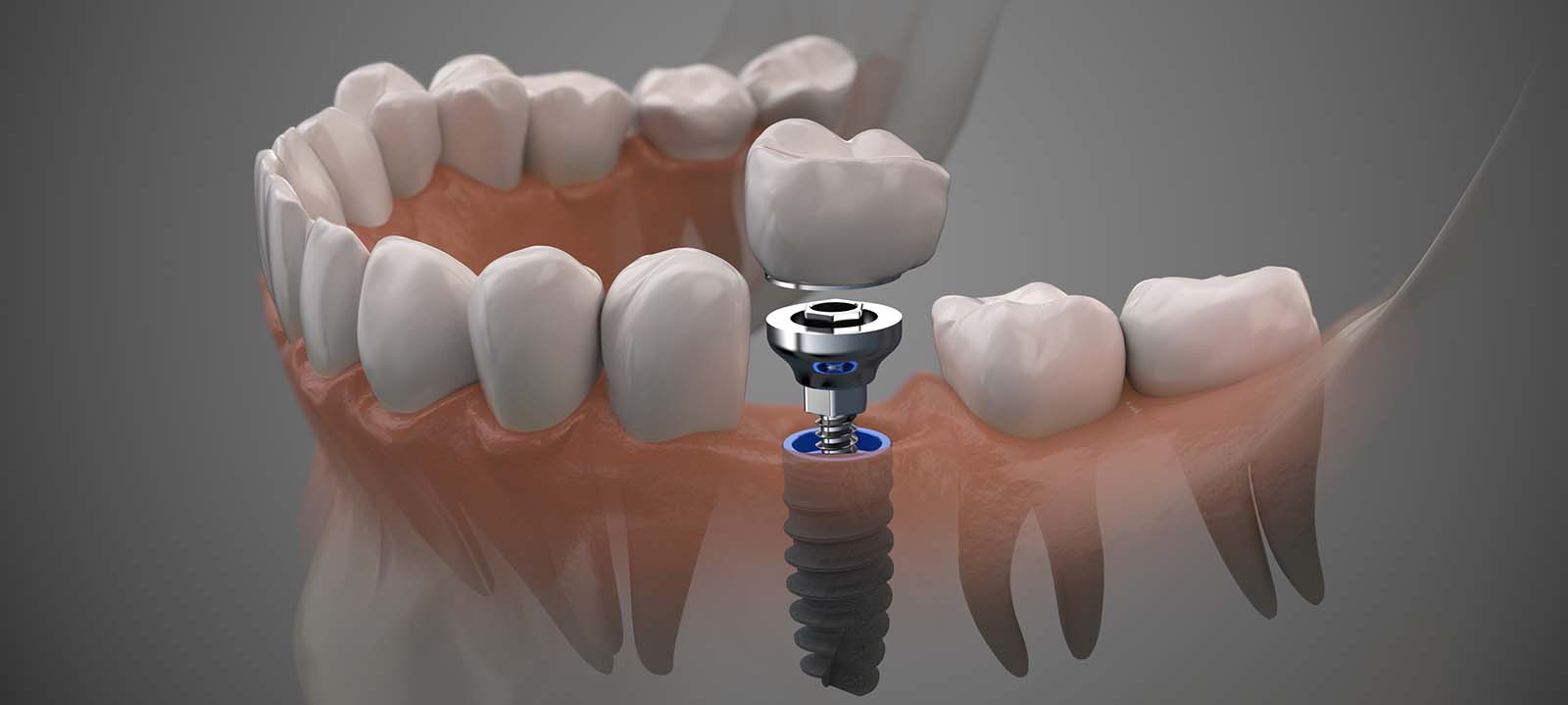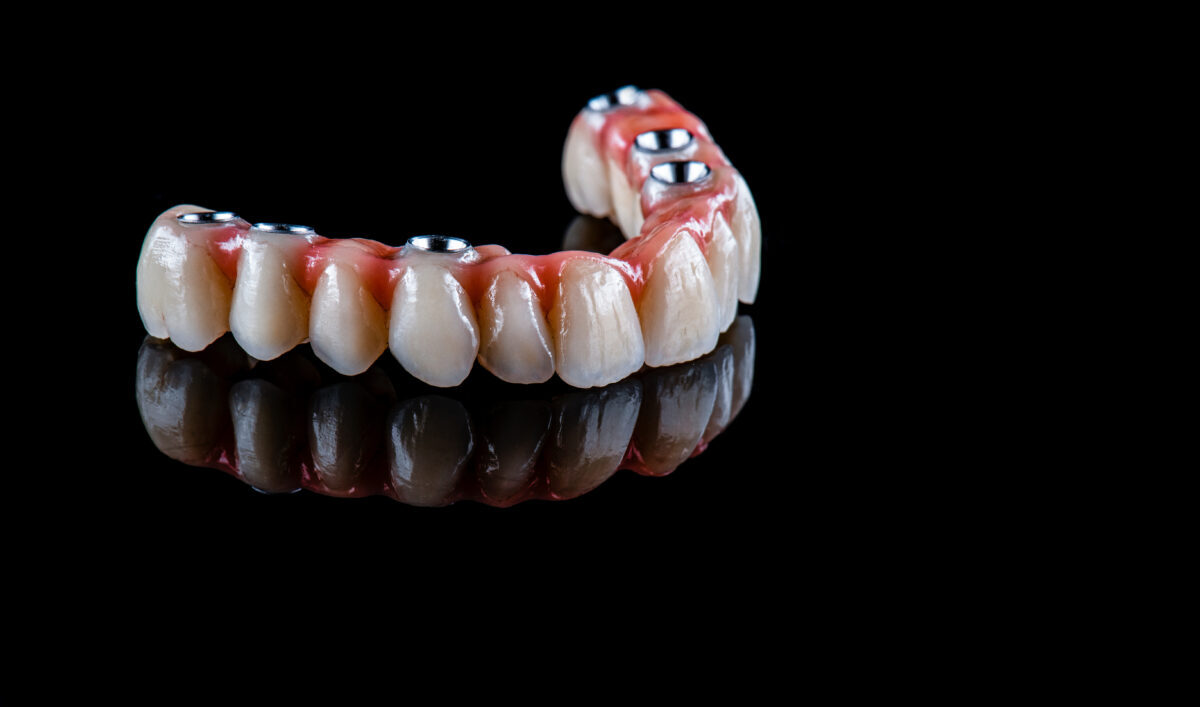When you are considering any sort of dental work, there are things you have to think about. Namely, we will need to determine if you are even a candidate for the procedure. In other words, would that particular procedure achieve your goals, and are you healthy enough to have it done? Tooth loss comes with a number of negative impacts, like speech change, trouble eating, bacteria buildup and shifting teeth. So, if one of more teeth, then you may wonder what procedures are available to you and if you are a good candidate for dental implants. We will discuss that in detail here. In this post, you will find out more about recognizing early signs of tooth loss and you will learn about dental implant options and what may or may not work for you.
The Onset of Tooth Loss
Before you can understand the need for dental implants in Los Angeles, you do need to have a better idea of how to recognize tooth loss, risk factors, and the implications of it. If you know the early signs of tooth loss, then you can get intervention sooner and avoid further complications.
Recognizing Early Signs of Tooth Loss
There are a number of early signs that tooth loss is coming. Knowing and watching for these important things will help you prepare or take steps to avoid tooth loss. They include the following:
- Chronic Gum Swelling
- Gum Recession
- Persistent Tooth Pain
- Loose Teeth in Adults
- Bad Breath
- Advanced Tooth Decay
- Chronic Gum DIsease
- Excessive Tooth Sensitivity
- Broken or Cracked Teeth
If you have one or more of these ongoing issues, then there is a good chance you may be on the road to slow progression or sudden tooth loss.
Common Causes and Risk Factors
The number one common cause of tooth loss is gum disease. In fact almost three quarters of tooth loss patients suffered their problems from this chronic illness. Other tooth loss causes can include injury, cavities, diabetes, and other diseases. The risk of developing the problem is higher due to the following risk factors: poor dental hygiene, poor nutrition, smoking, diabetes, chronic high blood pressure, and being born male.
Psychological and Physical Implications
The implications that come along with tooth loss can affect you in a number of ways. Mentally, it can cause frustration, embarrassment, anxiety and even depression. After all, we are always taught that our smile is our best foot forward. The physical implications of tooth loss can include bacteria entering the gums and causing further gum disease or even a painful gum abscess. You could end up losing bone and tissue, and if you lose much, then it can even change the look of your face. Changes to tooth alignment can lead to problems eating and even ongoing pain from improper bite. You can also experience ongoing jaw pain and toothache.
As you can see, catching tooth loss early can avoid quite a bit of pain for yourself. However, if you are experiencing tooth loss already, you do have options that we could help you with.
Dental Implants: An Overview
If you have already suffered from tooth loss, then we may be able to help you through dental implants. They offer a more permanent solution to the problem, restoring your smile and repairing and avoiding ongoing damage.
What Are Dental Implants
A dental implant is actually placed in the jaw bone and serves as an artificial tooth root. It can be used to place a single tooth or a bridge for multiple teeth. Since the implant serves as a root and does not rely on other current teeth as an anchor, they can avoid further damage or complications if that anchor tooth were to become compromised.
Types and Techniques
There are a few different ways dental implants can be used to repair your tooth loss. The first is full arch dental implants. With these, a permanent anchor is placed in the jaw and full teeth are placed for a permanent solution. We can do this as an in office, one day procedure. At Southland Dental, we offer all on four and all on six dental implant procedures that use four or six implant anchors respectively to completely replace all of your teeth in one sitting. We can give you a dramatic change and a whole new smile with one dental implant procedure.
If your tooth loss is not as severe and you only need one tooth replaced, this is an option as well. An anchor and new tooth will be placed in the gap as if the tooth was never missing.
General Procedure Outline
Before you have a dental implant procedure, you will likely want to know what to expect. First we will do a full dental health assessment to confirm you are a good candidate. If you are, then we want you to feel comfortable with the process, so here’s a general outline of what will happen that day.
- We Will Do X Rays and Exams
- We Will Take Impressions of Your Current Teeth
- You Will Have Pain Medications or Sedation
- A Small Opening Will Be Made in Your Gums
- A Hole WIll Be Drilled Deep into the Bone of the Jaw
- A Metal Post Will Be Placed into the Bone
- You Will Be Fitted with a Temporary Arch or Bridge
After the bone grows around the implants and solidifies them, you will then come back for the final placement of your new teeth. Final placement usually takes place a few months after the first procedure, giving your bone time to fully heal. Full mouth dental implants provide a completely new smile through this procedure.
Evaluating Candidacy for Dental Implants
Before you can move forward with a dental implant procedure, we will need to do a full assessment to evaluate your candidacy for this option. The good news is we do offer a complimentary evaluation along with x-rays and a CT-scan.
Dental Health Prerequisites
There are a few things we will need to evaluate before we can determine if you meet dental implant candidacy. In order to improve the dental implant success rate, we want to make sure you are a good candidate. Otherwise, we may wish to speak with you about other options. We will need to look at your jaw and assess your bone density for implants. We will also need to consider your overall health and any ongoing habits that could cause issues in the future.
Basically, you have to be old enough that your jaw has stopped growing. You must have generally healthy gums. And, you must have enough bone to support the implants.
Assessing Bone Density and Volume
First, we will assess bone density and volume. You must have enough healthy bone to support the implants. If we identify issues with bone density, this may not completely end your candidacy, but we may need to look at doing bone graft procedures to build up the healthy bone in the area.
Health and Lifestyle Considerations
Certain health and lifestyle conditions may make you a poor candidate for dental implants. Any of the following would fall into this category.
- Uncontrolled Diabetes
- Cancer Patients
- Patients Who’ve Received Radiation to the Jaw
- Uncontrolled Gum Disease
Additionally, if you smoke or are an alcoholic, this could also eliminate your candidacy. Other issues to note include people who take immunosuppressants, people who grind their teeth at night, or people who chronically clench their jaws.
Age-Related Considerations
Dental implants can be safe for older patients, but elderly individuals may be more at risk to complications due to age related issues. These issues may include uncontrolled diabetes, high blood pressure, stroke risk and heart disease. Also, elderly individuals may not have enough bone mass for the procedure. Age is a consideration, but is certainly not an automatic disqualification.
When Dental Implants Might Not Be Suitable
There are times when dental implants simply are not suitable. That doesn’t mean you have no options though. If the potential risk factors are too high compared to the reward or you do not meet the prerequisites, then we will discuss dental implant alternatives available to you.
Potential Risk Factors
You do need to know the risk factors associated with dental implants and we will evaluate those carefully before moving forward with your procedure Here is a list of those factors for you to consider in advance:
Bacteria build up due to poor dental hygiene could lead to gum recession, exposing the implants.
Any medical procedure could pose a risk of infection. Again, poor dental hygiene could lead to infection after the procedure.
Implants could be rejected by the body’s immune system. This risk factor is aggravated by smoking and teeth grinding.
If you smoke, you will need to take steps toward cessation. If you grind your teeth, then we will need to discuss a therapy for that before going forward with dental implants. If you are on immunosuppressant medications, your risk for infection increases. Finally, you must be willing to practice good oral hygiene in the future in order to avoid risk of implant loss.
Exploring Alternative Solutions
Dental implants are not the only missing teeth solutions, and if they are not suitable for you, then we can discuss other options and dental implant options. In addition to medical or physical reasons that a person may not be eligible, the cost of dental implants may also be a factor.
Depending on the extent of your tooth loss or damage, other options available to you may include: bridges, crowns, dentures, or flippers. Even if you decide to not move forward with implants, either because you don’t qualify or you are not interested in dental implant risks, then we would still like to discuss your options and alternatives with you.
Weighing the Pros and Cons of Dental Implants
Before you can make a decision for your own tooth loss problem, consider the pros and the cons of dental implants. It’s always very important to know both positives and negatives of any procedure before moving forward with it.
Understanding the Benefits
There are quite a few dental implant benefits that can greatly restore your quality of life. Because tooth loss can have a negative impact on chewing and talking, the implants can restore both. Tooth loss can also affect the outward appearance of the face and mouth. The procedure can resolve this issue as well. Other benefits include slowing or stopping bone loss, preserving surrounding gum health, and maintaining stability of other healthy teeth. Overall, implants can drastically improve quality of life.
Considering the Drawbacks
As important as it is to understand the positive benefits dental implants can offer to you, it is also important to understand the drawbacks of them as well. First of all, the dental implants cost can be high. For some, the cost may be out of their budget. As we mentioned previously, placing dental implants does mean surgery and any surgical procedure does come with risks such as infection, damage to jaw bones and teeth, nerve damage, and delayed healing. These risk factors are low, but important to note. Finally, also as previously mentioned, there is a risk of failure of the implants. If you would like to discuss the disadvantages and risks associated with dental implants, we would be happy to discuss them with you. Once you understand dental implant drawbacks, you can make the proper decision for yourself.
Financial Aspects of Opting for Dental Implants
The financial aspects of dental implants can be a deciding factor for some patients. Let’s take a look at the breakdown of costs you can expect from dental implant procedures. We will also discuss insurance discounts and payment options.
Cost Breakdown and Analysis
Here is a breakdown of full mouth dental implants cost:
A complimentary exam, consultation, x-rays and CT scan. We want to get started on the right foot and help you determine if you will qualify for dental implants. To start with, if you only need a single tooth replaced, the cost will be around $2500 and $3200 depending on the tooth placement and integrity of surrounding teeth and bone. If you need full mouth dental implants, the cost will be around $13,900.
There are a number of other associated procedures that may be needed in addition to the implant cost.
- X-rays and CT scans. These are fully complementary with us.
- Bone graft. This may be needed and will start at $250 depending on extensiveness.
- Teeth extraction. Depending on extensiveness, this could cost from $75 to $250
The costs of dental implants can become quite high. Understanding these expenses is vital to helping you make a decision for your own dental needs.
Insurance Discounts and Payment Plans
While for the most part, dental insurance will not fully cover implants, there are some parts of the procedure that can be covered. Additionally, some medical insurance may even cover some of the procedures. It can be a hard area to navigate, though. So here are some things to consider about dental insurance for implants.
Insurance may cover medically necessary areas, like tooth extraction and crown placement. It generally will not cover bone graft and placement of the implants because this part is considered purely cosmetic and not medically necessary.
Be sure to contact both your dental and medical insurance companies to discuss your plan and coverage.
Here at Southland Dental Care, we offer payment plans so that you can afford implants even if your insurance will not cover them. Single tooth implants start at just $69 a month and full mouth dental implants start at just $350 a month. We want to help you get the smile you deserve, so our goal is to help you afford dental implants.
The Journey After Getting Dental Implants
Post surgery dental care includes steps you will need to take at home as well as follow up appointments with us.
For the first 24 hours after the procedure, you will need to only consume soft foods and liquids. You will also need to use ice for the first few days to decrease swelling. The process for dental implant recovery before the final work can be done will take between 3-6 months. It is vital that you continue proper oral health maintenance during this time and throughout the rest of your life so that you can maintain your new teeth.
Dental implants are a long term solution, so you will need to continue coming in for checkups to ensure everything has healed and is maintained properly.
Patient Stories and Testimonials
If you read dental implant stories and patient testimonials, you will find that many people have very good experiences with the process. Here at Southland Dental Care, we are happy to share many of the positive testimonials from our patients.
Well-known actor Charlie Sheen said: “This is the smile I have seen in others and had wished I had in my own mouth and it’s right here. That fantasy, that dream was delivered as a reality.”
Another patient said “When I came here, it seemed the right thing to do. They fixed many other things. The final product, when they put it in my mouth…they felt like my normal teeth. I was very happy with the finished product”
One patient mentioned that before he came to Southland Dental Care, he experienced ongoing headaches from a poorly done bridge in the past. And, with new dental implants, he was much more comfortable moving forward.
Conclusion
We are dental implant specialists here at Southland Dental Care. Dr. Delaram Hanookai is here to help you gain the smile you have always wanted and to solve the tooth loss problems you are experiencing. Contact us today at 818 788-8787 to schedule your complimentary consultation. We look forward to helping you soon.
Frequently Asked Questions
Now that you have a very good understanding of dental implants, what to expect, the risks and the rewards, here are some dental implant FAQs to answer any lingering questions you may have.
1. How long will dental implants last?
If they are properly cared for, they can last a lifetime.
2. What kind of cost will there be if something needs to be fixed?
Many times, there is no cost. We will be glad to evaluate and repair any damage to your implants in the future. If there is a cost, we will discuss it with you first.
3. Are dental implants removable?
No. Unlike dentures, implants are designed to be permanent and are not removable.
4. Will the treatment be painful?
As with any surgical procedure, there will be discomfort. We help to minimize that by providing local or general anesthetic during the implant surgery and we will help manage the pain during recovery as well through post-surgery dental care and follow up appointments.
5. How long will the procedure take?
Depending on the depth of the surgery, this can vary. To do a single tooth implant, you can expect around an hour. For whole mouth implants, the time can be somewhere between 2-4 hours.
References
https://www.ncbi.nlm.nih.gov/pmc/articles/PMC7518499/
https://www.fda.gov/medical-devices/dental-devices/dental-implants-what-you-should-know
https://www.mayoclinic.org/tests-procedures/dental-implant-surgery/about/pac-20384622














